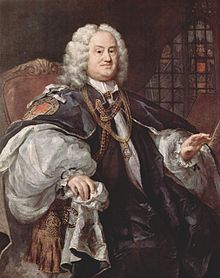Benjamin Hoadly
English prelate, Bishop of Bangor and Winchester
Biography
Benjamin Hoadly, whose name at least is still remembered in connection with the once famous Bangorian controversy, was born at Westerham in Kent in 1676, the second son of the Rev. Samuel Hoadly and his wife, Martha Pickering. He early distinguished himself as a zealous partisan of what is called 'religious liberty.' His father kept a school at Westerham and educated his son, who went from there to Catherine Hall, Cambridge.
In 1715, King George I made Hoadley Bishop of Bangor. The convocation which met after the accession of George I attacked Bishop Hoadly on account of a sermon preached by him, in 1717, on the text, "My kingdom is not of this World," in which he denied that the Church possessed authority to oblige any one to external communion or to pass any sentence which should determine the condition of men with respect to the favor or displeasure of God." The lower House of Convocation thought fit to denounce, through the report of a committee, the dangerous tenets of this discourse and of a work not long before published by the Bishop. A long and celebrated war of pens instantly commenced, known by the name of the "Bangorian Controversy". It was managed, perhaps on both sides, with all the chicanery of polemical writers and disgusting both from its tediousness, and from the manifest unwillingness of the disputants to speak ingenuously what they meant.
The principles, however, of Hoadly and his advocates appeared in the main, little else than those of Protestantism and toleration. The sentence of the laity, in the temper that was then gaining ground as to ecclesiastical subjects, was soon pronounced in their favor and the High Church party discredited themselves by an opposition to what might now pass for the incontrovertible truisms of religions liberty. In the ferment of that age it was expedient for the State to scatter a little dust over the angry insects. Hoadly's most able opponent was the celebrated William Law, author of the Serious Call.
He was transferred to Winchester in 1734, in which office he died, aged 85, some twenty-seven years later. He was buried in the nave of his Cathedral at Winchester.

